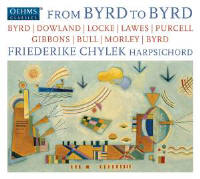Texte paru dans: / Appeared in: |
|
|
Outil de traduction (Très approximatif) |
|
|
Reviewer: Philip Kennicott Friederike Chylek, a German harpsichordist who has specialised in English keyboard music of the 16th and 17th centuries, has released her second album for Oehms Classics focusing, like the first, on her core repertoire, with a particular focus on William Byrd. She is determined to present the charismatic face of Byrd, works that are instantly accessible to contemporary ears, performed with an easy-going clarity that makes even the more abstract, intricately motivic works sound evocative and sensuous. Her harpsichord, a reproduction of a 1624 Ruckers instrument, is bright and lively, and the tuning rarely gives the ear any of the green lemon flavours that other harpsichordists prefer in this music (a sound I occasionally miss in these readings). Byrd’s works, including character pieces, hornpipes and the magnificent The Bells (in which listeners may detected a direct antecedent to contemporary minimalism) are supplemented with music by Dowland, Matthew Locke, William Lawes, Orlando Gibbons and Thomas Morley, and the Suite in D minor by Purcell (extending the chronology of the recording from the mid-16th almost to the dawn of the 18th century). The suite by Locke shows the player at her best, its short movements played with tenderness, easy ornamentation and unfussy dispatch. She brings the same sensibility to the Purcell suite, which is elastic, transparent and, despite the stately tempo, never particularly grand. Richard Egarr improvised a prelude for this three-movement collection, extending it, emphasising the richness of Purcell’s creation. He rendered the Almand with particular darkness and deliberation and the concluding Hornpipe with a ferocious snap and martial vigour. In Chylek’s hands, the suite pearls along pleasantly, for the most part brightly, with thin and fleet ornamentation, and without underscoring the musical sophistication of this exceptional little collection. Chylek is drawn to charm, which she renders with refinement and without distortion. If the Byrd Fantasia in C is somewhat amorphous, there are more than ample compensations in the shorter, less abstruse pieces. Other performers will make the case that this is great music; Chylek succeeds in proving that it also has surface appeal in abundance. |
|




